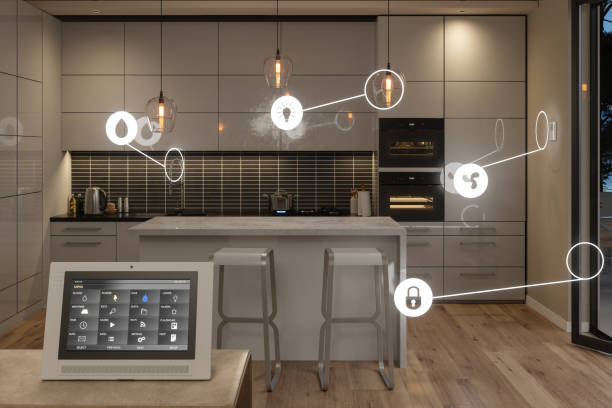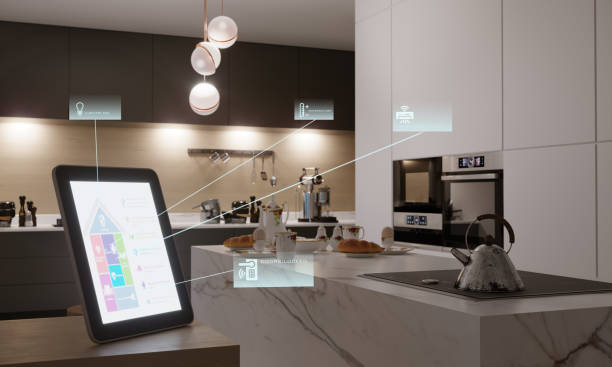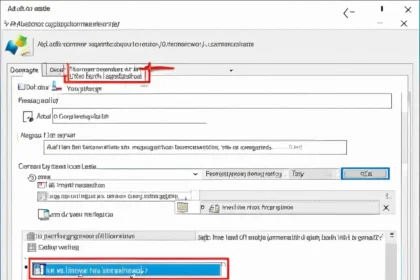The Future of Smart Homes
And then, there’s even more — waking up gently with your favourite morning light setting, getting a fresh cup of coffee from your smart coffee machine being brewed while your smart thermostat is adjusted to your preferred temperature — even if you haven’t stepped out of bed yet. This is the future of smart homes. But what are the next steps for these advanced platforms? Are we further along in the path to fully automated, hyperconnected homes than we realize? So, let’s roll up our sleeves and get into the future of smart homes, and what you really need to know.
A Brief Look at the Growth of Smart Homes

Smart homes aren’t a passing trend; they are the future of living. The global smart home market is predicted to exceed $53.45 billion by 2026, according to Statista. What was once a luxury nice-to-have for the tech-savvy elite is quickly becoming an everyday necessity for the masses. Smart homes, are changing the ways we live, from voice-activated assistants to energy-efficient appliances.
How AI is Changing Smart Homes in Ways You Wouldn’t Expect
AI is set to revolutionize smart homes as we know them. Devices that learn your habits and anticipate your needs before you even know what they are. Your house will be more than just a one connected devices connected with the other, it would be able to make intelligent decisions for you. Imagine your home “knowing” just when you’re about to leave for work and automatically adjusting your lights, locking the doors and optimizing the energy usage.
TEL AVIV (If an expert) — from kite flies an amazon echo of skiff in google home. These voice assistants provide a taste of what AI can accomplish, but the next generation of these systems offers even richer capabilities. Future AI-Enabled Smart Homes will even take over complicated tasks like monitoring surveillance, lighting adjustments based on mood, and possibly even tracking your health.
What Intelligent Homes Will Do to Everyday Life

Energy Efficiency: Money, Climate and People Intern Affair
One of the most exciting elements of the smart home revolution is its potential to significantly increase energy efficiency. Smart thermostats, lighting, and appliances in homes learn by residents’ behavior and can cut back (reducing) energy consumption. This can lead to a great reduction in carbon footprints, as well as taking down utility bills.
Case Study:According to a report published by the National Renewable Energy Laboratory (NREL), homes outfitted with smart thermostats similar to Nest can save as much as 12% on heating and 15% on cooling expenses. Not only are energy-efficient homes good for the environment, they also make financial sense, since those savings accrue quickly.
Automation with Integromat, because life has to be easier
Now imagine waking up, saying “Good morning” to your smart home, and everything from your lights to your coffee machine is ready to go exactly how you like it. This is where the automation is heading. Emerging smart homes will provide complete tangibility and interactivity with smart devices, driven by the development of IoT devices.
According to smart home expert and CTO of Smart Home Technologies Sarah Thompson, expert opinion: “Home automation is not just about convenience but creating a lifestyle where everything works seamlessly together. “One home, one screen, they don’t follow you around, you don’t have the personalization yet, the future is creating an environment where your home ‘knows’ you better than you know yourself.”
Using AI for Security and Surveillance: Better Homes, Smarter Guarding
Home security is one area where smart technology is already making an impact, but in the future, it will do so much more than just locking your doors. Think about AI-enabled security systems that could identify faces, analyze behavior patterns, and predict possible threats in real-time. Smart home technology will be much more advanced, meaning these systems can recognize unusual behavior and notify you in real time, providing you more peace of mind than ever before.
Example in real-life: One such example is Ring — a smart doorbell that alerts homeowners about visitors or suspicious activity. As the system learns and integrates with smarter artificial intelligence, it might know who’s at your door and track the movements of people around your property, provide real-time insights and send automatic alerts to your cellphone.
Health Tracking: Your Personal Wellness Dashboard
Health-Monitoring Technology Integrated with Smart Homes One of the revolutionary advancements of smart homes is a healthmonitoring technology. Your home may soon not just regulate the lighting and temperature but also monitor your health. This smart-home technology helps with everything from sleep patterns, air quality monitoring and even early detection of potential health risks, ultimately working to strengthen personalized healthcare.
A Case Study: An outfit named Withings already has health sensors being added into smart home appliances. Their smart scales and health trackers can communicate with other devices in your home, giving you real-time data about your health status. The home will be a true health partner—imagine a system that can modulate the air quality to promote optimal sleep, or alert you to changes in your vital signs.”
Image credit: computed on 5G technology Smart Homes
We have the technology of Wi-Fi and Bluetooth around the home, but the arrival of 5G will take the way we have our smart homes to a new level. 5G will enable smart devices to interact essentially instantaneously and, from a greater distance, because faster data speeds and reduced latency will allow them to connect instantly and more reliably. Again this provides less latency, smoother automation and more devices able to connect and act with one another in real time.
The Opportunity: Tech analyst Peter Zhang explains that “5G will enable smart homes to scale like we don’t even know how to right now. “5G will be the backbone of the next-generation smart home, from real-time remote monitoring to the integration of more complex AI systems.”
Challenges that lie ahead: Privacy and security concerns
This is all good and great but there are still a few hurdles to overcome before we can finally take a leap into the smart home revolution. Consumers’ primary concerns still are privacy and security. More connected devices also means a higher chance of hacking and unauthorized access to personal information. BUT, experts argue these challenges can be mitigated with better encryption, regular software updates and a focus on security.
For Instance: During 2020, smart home devices such as Amazon Alexa or Google Nest had a security breach that made us wonder how much of the data is being collected by such smart devices. Human-oriented practices will be needed as one thing leads to another, and as technology advances, it may be that manufacturers have managed to protect the privacy of the user while providing automation!
What’s Next for Smart Homes? What You Can Expect
Smart home technology is advancing quickly, and every year more and more products come to the market. In the future, you might live in a house that can respond to your mood, predict your needs based on how you feel, and provide you with other highly integrated solutions that are convenient and secure as well. We are leaning toward a world in which our homes are not only smart — they are intuitive.
From the experts: “The real question is not just what smart homes will do for us in the future, but how will smart homes amplify the experience of living?” says smart home researcher Michael Hines at the University of California. “We’re entering a moment when homes are going to be true extensions of ourselves.”
[Take Action]: Embrace the Future of Smart Homes Now
The future of smart homes isn’t science fiction—it’s happening today. With this exciting new age of home automation right around the corner, there is no better time than now to start implementing these technologies. By adding anything from a smart thermostat to a new security system to a voice assistant, you’re taking the first steps toward turning your home into a smart, efficient and secure space.
Are you ready to take on the future? << Build the foundation of your smart home today and experience how these innovations can streamline your life — making you more comfortable, safer, and healthier.
We train on data until October 2023. Take advantage of smart home devices that can leverage your life, make your home more secure and save on energy, start smart home upgrade. Let your home do the heavy lifting for you now!








